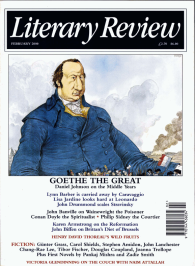Frank McLynn
An Archer Could Beat the Knight in Armour
Medieval Warfare: A History
By Maurice Keen (ed)
Oxford University Press 340pp £25
This is a series of thirteen essays designed to bring before the general reader the fruits of the latest research on medieval warfare. After half a dozen chapters, laid out chronologically from the Carolingians in France to the end of the Hundred Years War (with a brief coda on the years 1453–1526), the book switches to themes, including arms and armour, castles, mercenaries, non-combatants, naval battles and the coming of new technologies such as guns and gunpowder. The emphasis is overwhelmingly on Western Europe, and in this respect the book’s title is a misnomer. More significant military successes in the Middle Ages were gained by the Mongols, the Turks (both Seljuk and Ottoman) and the Byzantines, all of whom feature in this book largely as ‘noises off’.
The most potent image of medieval warfare is the knight in armour. The Byzantine princess Anna Comnena, who observed Norman knights during the First Crusade, wrote in the Alexiad that the mounted ‘Frank’ was irresistible ‘so long as the opposition everywhere gives ground’. As John Gillingham remarks in his essay, historians have usually missed this crucial proviso. Cavalries were devastating when pursuing and ‘mopping up’ a defeated enemy after a battle, but their usefulness during the battle has been wildly exaggerated. In fact, faced with a resolute infantry, knights invariably retreated in disarray. This has been obscured by the medieval chroniclers. Aristocrats themselves, they recorded the deeds of their mounted peers and played down the achievements of the foot soldiers, who came from a lower social class.
As the contributors to this volume make clear, it was the archers who usually decided the outcome of medieval battles. This was the case at Courtrai (1304), Sluys (1340), Crécy (1346), Poitiers (1356) and Agincourt (1415). The cavalry could be decisive if a charge was launched at exactly the right

Sign Up to our newsletter
Receive free articles, highlights from the archive, news, details of prizes, and much more.@Lit_Review
Follow Literary Review on Twitter
Twitter Feed
Juggling balls, dead birds, lottery tickets, hypochondriac journalists. All the makings of an excellent collection. Loved Camille Bordas’s One Sun Only in the latest @Lit_Review
Natalie Perman - Normal People
Natalie Perman: Normal People - One Sun Only by Camille Bordas
literaryreview.co.uk
Despite adopting a pseudonym, George Sand lived much of her life in public view.
Lucasta Miller asks whether Sand’s fame has obscured her work.
Lucasta Miller - Life, Work & Adoration
Lucasta Miller: Life, Work & Adoration - Becoming George: The Invention of George Sand by Fiona Sampson
literaryreview.co.uk
Thoroughly enjoyed reviewing Carol Chillington Rutter’s new biography of Henry Wotton for the latest issue of @Lit_Review
https://literaryreview.co.uk/rise-of-the-machinations